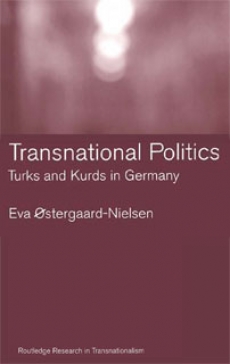 Transnational Politics: Turks and Kurds in Germany
Modern communications make it easier for all types of migrants to stay in touch with their country of origin meaning that migrants’ transnational engagement is an increasingly important and relevant topic. Transnational Politics shows how the politics of one country, Turkey, plays itself out in another, Germany, through the presence and engagement of migrants and refugees.
This book offers a unique case study of transnational political engagement of Turkish and Kurdish migrants and refugees in Germany and the political impact of these at national and international levels. Turkish and Kurdish organizations in Germany not only mobilize in relation to immigrant political issues of equal rights, discrimination, and citizenship in Germany, but also in relation to the domestic and foreign political situation in Turkey. In this way they become a linkage group between Turkey and Germany.
The case of migrants and refugees from Turkey to Germany is in many ways paradigmatic for how migrants’ transnational practices occur and are perceived in a European context. This book will be of value to readers with an interest in the politics of international migration and migrant transnationalism and in the ways in which migrants themselves challenge and contribute to processes of democratization in both their country of origin and settlement. Contents
Acknowledgements / x
Abbreviations / xii
1 Introduction / 1
2 Migrants’ transnational claims-making: rethinking concepts and theories / 13
3 Migration, transnational spaces, and German-Turkish relations / 33
4 Between homeland political and immigrant political mobilization / 46
5 From confrontational to multi-layered strategies: Turkish and Kurdish information campaigns in Germany / 70
6 Thresholds of tolerance: Turkish politics within German political institutions / 85
7 From ‘remittance machines’ to ‘Euro Turks’: Turkey’s changing perceptions of Turkish citizens abroad / 107
8 Conclusions / 123
Appendix A: Table and figures / 135
Appendix B: Methodology / 137
Appendix C: Migrant associations, political parties, and state agencies with whom interviews were conducted / 140
Notes / 148
References / 158
Index / 171 Introduction
This book is about how the politics of one country plays itself out in another through the presence and agency of migrants and refugees. It is about transnational mobilization and strategies of migrants and refugees, and the way that such engagement is perceived by political actors in their country of settlement and origin. Diasporas, such as the Jewish and Armenian, are known for their continuous engagement in their homelands. Yet, increasingly all types of migrants and refugees are no longer assumed to make a sharp break with their country of origin. Air travel, electronic communication, satellite television, and the Internet render geographical distances relatively insignificant. Migrants and refugees may, therefore, retain or develop interest in, and engagement with, political developments in their homeland with greater intensity than previously. This can result in anything from the formation of solidarity groups with persecuted movements to the defence of the homeland political regime. In this way, migrants and refugees become a linkage group between their receiving country and their homeland. The distinctive forms of migrant politics introduce the politics of their homeland into their country of settlement and provide an external dimension to the politics of their country of origin by acting as a resource for political allies. Politics and democracy are thus less bounded by state borders.
Migrants’ and refugees’ transnational political engagement in their homelands raise sensitive issues regarding dual loyalty, the mobilization and manipulation of political power, and the influence of transnationalism on national and international systems. Indeed, the presence in one country of ‘transnational communities’ or ‘diasporas’, that is, immigrants or exiles whose social, economic and political universe reaches beyond state borders to their homeland, has been proclaimed to constitute an increasingly important feature of not only contemporary domestic politics but also transnational and international relations (Sheffer 1986; Huntington 1997; Adamson 2002). Certainly, the phenomenon of migrants’ transnational political networks and practices goes to the core of one of the central issues within political science: the fading dichotomy between the domestic and the international. Migrants’ transnational political networks and practices challenge state-bound assumptions about political communities and societies underlying so much of the social science literature... Transnational Politics
Turks and Kurds in Germany
Eva Østergaard-Nielsen
First published 2003
by Routledge
11 New Fetter Lane, London EC4P 4EE
Simultaneously published in the USA and Canada
by Routledge
29 West 35th Street, New York, NY 10001
Routledge is an imprint of the Taylor & Francis Group
This edition published in the Taylor & Francis e-Library, 2004.
© 2003 Eva Østergaard-Nielsen
All rights reserved. No part of this book may be reprinted or reproduced or
utilized in any form or by any electronic, mechanical, or other means,
now known or hereafter invented, including photocopying and recording,
or in any information storage or retrieval system, without permission
in writing from the publishers.
British Library Cataloguing in Publication Data
A catalogue record for this book is available from the British Library
Library of Congress Cataloging in Publication Data
Østergaard-Nielsen, Eva, 1969–
Transnational politics: Turks and Kurds in Germany/Eva Østergaard-Nielsen.
p. cm.
Includes bibliographical references and index.
1. Turks—Germany—Social conditions. 2. Kurds—Germany—Social
conditions. 3. Germany—Ethnic relations. 4. Marginality, Social—Germany.
5. Transnationalism. 6. Germany—Emigration and immigration. I. Title.
DD78.T87 O88 2003
305.89'435043'09049–dc21 2002068197
ISBN 0-203-36162-8 Master e-book ISBN
ISBN 0-203-37419-3 (Adobe eReader Format)
ISBN 0-415-26586-X (Print Edition)
Eva Østergaard-Nielsen is Marie Curie Research Fellow at the Migration Research Group, Department of Geography, Autonomous University of Barcelona. She has published on the subject of diasporas and the political participation of migrants, notably in Global Networks: A Journal of Transnational Affairs and Sais Review: A Journal of International Affairs.

PDF
Downloading this document is not permitted.
|